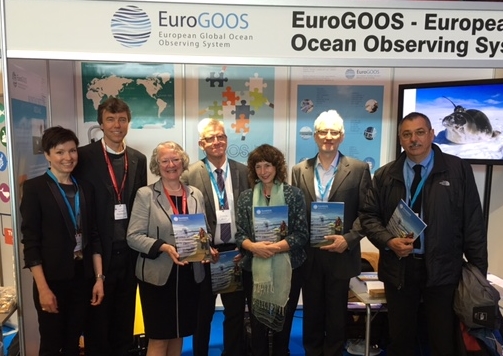At the European Maritime Day today, EuroGOOS has released its new policy brief, European operational oceanography: Delivering services for Blue Growth and ecosystem-based management. The publication was officially launched at the EuroGOOS exhibition stand in the presence of Gesine Meissner, Member of European Parliament, Sigi Gruber, European Commission DG Research and Innovation, Douglas Cripe, Group on Earth Observations, Vittorio Barale, European Commission Joint Research Centre, and Martin Visbeck, EU AtlantOS project.

Launch of the EuroGOOS Policy Brief at the European Maritime Day 2016, 28 May, Turku, from left: Dina Eparkhina, EuroGOOS, Martin Visbeck, AtlantOS, Gesine Meissner, Member of European Parliament, Erik Buch, EuroGOOS Chair, Sigi Gruber, Head of Marine Resources Unit, European Commission DG R&I, Douglas Cripe, Group on Earth Observations, and Vittorio Barale, EC Joint Research Centre
The EuroGOOS policy brief highlights the paramount role of ocean observing and marine data, underpinning the Blue Growth sectors. Continuous ocean observing and data collection is a critical research area and a prerequisite for exploring new opportunities for blue economy. The ocean observing data and information are required to meet a large number of societal challenges, from food security, to climate change, ecosystem health, or water management. All GEO societal benefit areas require oceanographic services and products to reach the GEOSS objectives. As do most of the UN’s Sustainable Development Goals (SDGs). In particular SDG14, designed to help conserve and sustainably use the ocean.
The publication highlights three specific areas requiring more development and integration as well as funding support to coordinate activities in the coming years: operational ecology service for ecosystem-based management, coastal oceanography integration, and advanced modelling and forecasting. The paper also stresses the need for an overarching end-to-end integrated ocean observing framework for Europe. The European Ocean Observing System (EOOS) will help define the landscape of the current European ocean observing capacity and reinforce synergy to fill the existing gaps. The EOOS process will encompass the three priorities mentioned in the policy brief.
The EuroGOOS booth at the European Maritime Day (18-19 May 2016, Turku, Finland) has become a real ocean observing hub of the exhibition. It profiles a wide range of strategic and coordination activities with the involvement of EuroGOOS and its partners, among others, AtlantOS, COLUMBUS, Euro-Argo and FixO3. The newly launched UK National Partnership for Ocean Prediction, a joint initiative by EuroGOOS members MetOffice, Cefas, and NOC, as well as Plymouth Marine Lab (PML) is also presented. Furthermore, the recent Ocean Enterprise Industry Study is presented delivered by the US IOOS, the EuroGOOS counterpart in the Global Ocean Observing System, GOOS, Regional Alliances. The Finnish Meteorological Institute, FMI, EuroGOOS member, has provided their state-of-the-art ocean glider, an autonomous underwater vehicle, capable of collecting a wide range of physical, chemical and biological marine data, to illustrate the ocean observing technologies.
The post EuroGOOS policy brief launched at European Maritime Day appeared first on EuroGOOS.

















